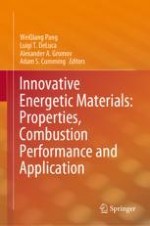2020 | OriginalPaper | Chapter
12. Burning Rate of PVC—Plastisol Composite Propellants and Correlation Between Closed Vessel and Strand Burner Tests Data
Authors : Abderrahmane Mezroua, Michel H. Lefebvre, Djalal Trache, Kamel Khimeche
Published in: Innovative Energetic Materials: Properties, Combustion Performance and Application
Publisher: Springer Singapore
Activate our intelligent search to find suitable subject content or patents.
Select sections of text to find matching patents with Artificial Intelligence. powered by
Select sections of text to find additional relevant content using AI-assisted search. powered by
